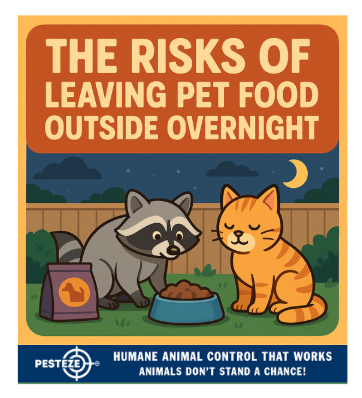THE RISKS OF LEAVING PET FOOD OUTSIDE OVERNIGHT

THE RISKS OF LEAVING PET FOOD OUTSIDE OVERNIGHT
SUMMARY
Leaving pet food outdoors overnight might seem harmless, but it can attract unwanted wildlife, insects, and even pose health risks to your pets. This guide explains the hidden dangers of leaving pet food outside and how to prevent common problems associated with it.
FEATURES
-
Attracts wildlife: Pet food can draw raccoons, opossums, skunks, and even larger predators.
-
Encourages insect infestations: Ants, flies, and cockroaches quickly swarm outdoor food sources.
-
Spreads diseases: Wildlife and insects may contaminate food with harmful bacteria or parasites.
-
Increases pet health risks: Stale or contaminated food can cause illness in cats and dogs.
-
Promotes dependency in strays: Stray animals may rely on your home for nightly meals.
-
Creates neighborhood problems: Feeding wildlife indirectly may increase conflicts and nuisances.
GUIDE DESCRIPTION
While many pet owners feed their pets outdoors for convenience, leaving food outside overnight can cause significant problems. Animals, both domestic and wild, have keen senses of smell and are naturally drawn to easy food sources. What may start as a simple habit can quickly turn into a safety and sanitation concern.
One of the biggest risks is attracting wildlife. Common visitors include raccoons, skunks, and opossums, but depending on your area, it may also draw coyotes, foxes, or bears. These animals are opportunistic feeders and may return regularly once they find food. This not only increases their dependency but also creates a danger for pets and people who encounter them.
Outdoor pet food also encourages insect infestations. Ants, cockroaches, flies, and beetles quickly swarm on exposed food, contaminating it and spreading into your home. Infestations can become costly and difficult to control once established.
Another major concern is disease transmission. Wild animals and insects that come into contact with pet food can carry harmful pathogens such as salmonella, leptospirosis, or parasites like roundworms. When pets later eat this contaminated food, they may become sick or spread these illnesses to humans.
Even without outside contamination, stale or spoiled food can harm your pet’s health. Overnight exposure to moisture, heat, or insects reduces food quality and increases the risk of digestive issues, vomiting, or infections.
Leaving food out can also unintentionally support stray animals. Cats, dogs, or other animals in the area may come to rely on your property for food. While it may seem kind-hearted, it can encourage overpopulation and discourage strays from being properly cared for by shelters or rescues.
On a larger scale, leaving food outdoors creates neighborhood problems. Attracted wildlife may damage property, dig through trash, or even attack smaller pets. These disturbances can strain neighbor relations and create risks for your community.
To avoid these issues, feed pets indoors whenever possible. If feeding outdoors is necessary, provide meals at set times during the day and remove leftovers immediately. Using covered feeding stations or raised bowls can also minimize access by pests.
By taking these simple steps, you can keep your pets safe, reduce risks of disease, and avoid creating long-term wildlife or pest problems in your area.
- Saneeth Thota


Comments 0